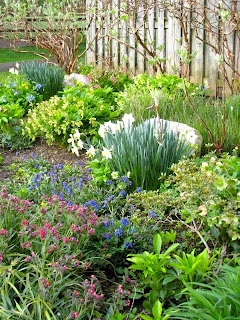The
old saying, “What goes around, comes around”, seems to be true with
gardeners. Did Grandma know that
some day gardening would be America’s #1 leisure activity and a very huge
business? Was Grandma’s gardening
different than today’s Gardeners?
Most of our garden traditions and trends today
originated during the period of Grandmother’s Garden (1865 – 1915). Just as people then were yearning for a
simpler life – nostalgia for the past as they faced the new industrial
revolution – so we are people looking for a simpler time during the technology
and information age.
Today’s gardener reinvented the past while
creating new trends for the future.
Let’s take a look at the hot gardening trends.
We will see more gardening than ever
before. The recession has forced
people to stay at home and this has created a need for people to look into
their backyards and see if they actually like being there. People are appreciating the value of
their outdoor space as a place to enjoy, relax, exercise and connect back with
nature and neighbors.
Now along with belt-tightning and downsizing,
there is a welcome trend emerging – a return to Main Street American Values.
Gardeners will dig even deeper into old-fashioned values around the
yard today, trend-watchers predict. Tops on the List: another increase in
traditional vegetable gardening. Veggie gardening was up nearly 20% this year on top of a 10% gain the year
before, according to National Gardening Association research.
The leading three reasons: better taste, saving money and better
quality food. Hand in hand with
that came hefty resurgences in seed –starting and the home-canning of produce –
two other age-old practices that had tapered drastically in the last
generation.
We will see more edible landscapes in the
future. How about a lettuce border
for your perennial bed? People
will continue to plant their own food and probably get braver with more
interesting varieties (the seed companies had absolute banner years!) Some predict that people will begin to
intersperse edible plants into their garden beds – blueberries, fruit trees,
perennial herbs and perennial edibles like strawberries, rhubarb, asparagus –
and use them as ornamental plants.
They also predict that more people will try and plant urban orchards – groups
of a few trees – as more and more lawn gets replaced.
Organics will continue its
take-over. Eco-Boosting is in and
Chemical Dependent Gardens are out.
Get used to terms like:
eco-bounty, eco-frugal, eco-metering, and eco-concierge that are
sprouting up on blogs and social media.
Green is the new black as consumers seek products that work with nature
not against. It.
As we look to the future we see water
conservation getting a bigger play.
The trend to capture rainwater in rain barrels has gained a lot of
momentum and will continue.
We will also see the development of more native
and wildlife gardens. More people
will also get involved in landscape and garden projects in their communities.
I wonder what Grandma would think of these
trends and how things have or have not changed. Sunflowers were popular then, as they have become once
again. Tropical plants,
especially those with bold foliage, were introduced into the more formal
gardens, another trend rediscovered in today’s gardens. Roses, peonies, phlox and hollyhocks
were among the perennials commonly planted in Grandma’s time.
The old fashioned gardens incorporated
vegetables and fruits for aesthetics, show and food. They were located close to the house and often used as
intimate living space or an outdoor room, much as we see in today’s home
garden.
Higher fuel costs are expected to lure us off
the highways and keep us closer to home for our entertainment and relaxation
needs. So Grandma, our backyards
now serve a playground, living room, kitchen, home offices and havens.
We have come a long way but we are a true
reflection of our own gardening heritage.
What about you? What are some of your family traditions with gardening and growing?
What about you? What are some of your family traditions with gardening and growing?


No comments:
Post a Comment